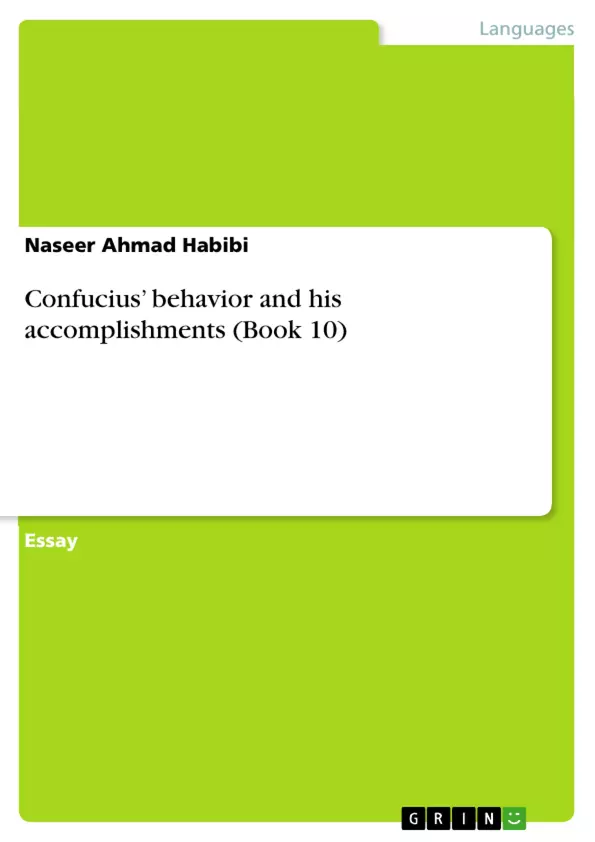The essay is about Confucius' life, behavior,and his attitude toward people above and below him in rank.
Table of Contents
- Confucius' Behavior and Accomplishments
- Respect for All
- The Master's Behavior with Those Above and Below Him in Rank
- Confucius' Personality and Character
- Confucianism: Pursuit of Virtue
- Confucius' Teaching Style
- Confucius' Lifestyle and Habits
- Living According to Rites
- Summary and Purpose of Book Ten
Objectives and Key Themes
This essay aims to analyze the character of Confucius as portrayed in Book Ten of his Analects. The essay explores Confucius' behavior and accomplishments, his interpersonal relationships, his lifestyle, and the significance of his teachings. Key themes and objectives:- Confucius' respect for all individuals, regardless of rank
- His unique approach to interacting with those above and below him in rank
- The importance of virtue and self-cultivation in Confucianism
- Confucius' teaching methods and his emphasis on the study of ancient texts
- The relevance of Confucius' teachings and lifestyle to our lives today
Chapter Summaries
This section discusses the main themes and arguments of the text, excluding any content from the final chapter. * **Confucius' Behavior and Accomplishments:** The essay begins by discussing Confucius' behavior and accomplishments, emphasizing his dedication to teaching and the influence of his philosophy. * **Respect for All:** The essay highlights Confucius' profound respect for all individuals, regardless of their social standing. Examples of his humility and courtesy towards everyone are presented. * **The Master's Behavior with Those Above and Below Him in Rank:** This section delves into Confucius' unique approach to interacting with those of higher and lower rank. His solemnity in the presence of his lord and his friendly demeanor with counsellors of lower rank are discussed. * **Confucius' Personality and Character:** The author describes Confucius' gracious and commanding personality, highlighting his love of knowledge, virtue, and his unwavering commitment to his students. * **Confucianism: Pursuit of Virtue:** This section focuses on Confucius' philosophy of virtue and self-cultivation. The essay emphasizes the importance of good example, self-control, and the study of ancient classics in the pursuit of moral perfection.Keywords
Confucius, Analects, virtue, respect, rank, humility, teaching, ancient texts, lifestyle, rites, self-cultivation, Chinese philosophy.Frequently Asked Questions
What is analyzed in Book Ten of the Analects?
Book Ten focuses on Confucius' daily life, his behavior, interpersonal relationships, and his attitude toward different social ranks.
How did Confucius treat people of different ranks?
He showed profound respect for everyone. He was solemn with his lord but friendly and courteous with counselors of lower rank.
What are the key themes of Confucianism mentioned?
The pursuit of virtue, self-cultivation, respect for all individuals, and the importance of living according to rites.
What was Confucius' teaching style?
He emphasized the study of ancient texts and the importance of providing a good moral example through self-control.
Why is Book Ten significant for understanding Confucius?
It provides a detailed look at his personality, character, and lifestyle, making his abstract philosophy more tangible.
- Quote paper
- Naseer Ahmad Habibi (Author), 2012, Confucius’ behavior and his accomplishments (Book 10), Munich, GRIN Verlag, https://www.grin.com/document/200879



